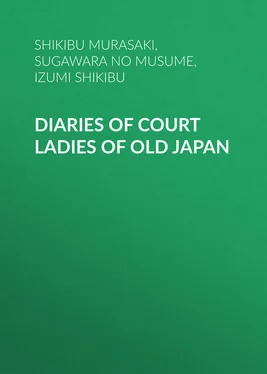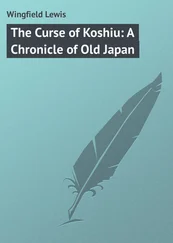Shikibu Murasaki - Diaries of Court Ladies of Old Japan
Здесь есть возможность читать онлайн «Shikibu Murasaki - Diaries of Court Ladies of Old Japan» — ознакомительный отрывок электронной книги совершенно бесплатно, а после прочтения отрывка купить полную версию. В некоторых случаях можно слушать аудио, скачать через торрент в формате fb2 и присутствует краткое содержание. Жанр: История, foreign_edu, на английском языке. Описание произведения, (предисловие) а так же отзывы посетителей доступны на портале библиотеки ЛибКат.
- Название:Diaries of Court Ladies of Old Japan
- Автор:
- Жанр:
- Год:неизвестен
- ISBN:нет данных
- Рейтинг книги:4 / 5. Голосов: 1
-
Избранное:Добавить в избранное
- Отзывы:
-
Ваша оценка:
- 80
- 1
- 2
- 3
- 4
- 5
Diaries of Court Ladies of Old Japan: краткое содержание, описание и аннотация
Предлагаем к чтению аннотацию, описание, краткое содержание или предисловие (зависит от того, что написал сам автор книги «Diaries of Court Ladies of Old Japan»). Если вы не нашли необходимую информацию о книге — напишите в комментариях, мы постараемся отыскать её.
Diaries of Court Ladies of Old Japan — читать онлайн ознакомительный отрывок
Ниже представлен текст книги, разбитый по страницам. Система сохранения места последней прочитанной страницы, позволяет с удобством читать онлайн бесплатно книгу «Diaries of Court Ladies of Old Japan», без необходимости каждый раз заново искать на чём Вы остановились. Поставьте закладку, и сможете в любой момент перейти на страницу, на которой закончили чтение.
Интервал:
Закладка:
Next morning we crossed over the mountain. 21 21 Hakoné Mountain has now become a resort of tourists and a place of summer residence.
Words cannot express my fear 22 22 Fear of evil spirits which probably lived in the wild, and of robbers who certainly did.
in the midst of it. Clouds rolled beneath our feet. Halfway over there was an open space with a few trees. Here we saw a few leaves of aoi 23 23 Aoi, or Futaba-aoi. At the great festival of the Kamo shrine in Kioto the processionists crowned their heads with the leaves of this plant, so it must have been well known.
[ Asarum caulescens ]. People praised it and thought strange that in this mountain, so far from the human world, was growing such a sacred plant. We met with three rivers in the mountain and crossed them with difficulty. That day we stopped at Sekiyama. Now we are in Suruga Province. We passed a place called Iwatsubo [rock-urn] by the barrier of Yokobashiri. There was an indescribably large square rock through a hole in which very cold water came rushing out.
Mount Fuji is in this Province. In the Province where I was brought up [from which she begins this journey] I saw that mountain far towards the West. It towers up painted with deep blue, and covered with eternal snow. It seems that it wears a dress of deep violet and a white veil over its shoulders. From the little level place of the top smoke was going up. In the evening we even saw burning fires there. 24 24 Mount Fuji was then an active volcano.
The Fuji River comes tumbling down from that mountain. A man of the Province came up to us and told us a story.
"Once I went on an errand. It was a very hot day, and I was resting on the bank of the stream when I saw something yellow come floating down. It came to the bank of the river and stuck there. I picked it up and found it to be a scrap of yellow paper with words elegantly written on it in cinnabar. Wondering much I read it. On the paper was a prophecy of the Governors [of provinces] to be appointed next year. As to this Province there were written the names of two Governors. I wondered more and more, and drying the paper, kept it. When the day of the announcement came, this paper held no mistake, and the man who became the Governor of this Province died after three months, and the other succeeded him."
There are such things. I think that the gods assemble there on that mountain to settle the affairs of each new year.
At Kiyomigaseki, where we saw the sea on the left, there were many houses for the keepers of the barriers. Some of the palisades went even into the sea.
At Tagonoura waves were high. From there we went along by boat. We went with ease over Numajiri and came to the river Ōi. Such a torrent I have never seen. Water, white as if thickened with rice flour, ran fast.
I became ill, and now it is the Province of Totomi. I had almost lost consciousness when I crossed the mountain pass of Sayo-no-Nakayama [the middle mountain of the little night]. I was quite exhausted, so when we came to the bank of the Tenryu River, we had a temporary dwelling built, and passed several days there, and I got better. As the winter was already advanced, the wind from the river blew hard and it became intolerable. After crossing the river we went towards the bridge at Hamana.
When we had gone down towards the East [four years before when her father had been appointed Governor] there had been a log bridge, but this time we could not find even a trace of it, so we had to cross in a boat. The bridge had been laid across an inland bay. The waves of the outer sea were very high, and we could see them through the thick pine-trees which grew scattered over the sandy point which stretched between us and the sea. They seemed to strike across the ends of the pine branches and shone like jewels. It was an interesting sight.
We went forward and crossed over Inohana – an unspeakably weary ascent it was – and then came to Takashi shore of the Province of Mikawa. We passed a place called "Eight-Bridges," but it was only a name, no bridge and no pretty sight.
In the mountain of Futamura we made our camp under a big persimmon tree. The fruit fell down during the night over our camps and people picked it up.
We passed Mount Miyaji, where we saw red leaves still, although it was the first day of the Tenth month.
Furious mountain winds in their passing
must spare this spot
For red maple leaves are clinging
even yet to the branch.
There was a fort of "If-I-can" between Mikawa and Owari. It is amusing to think how difficult the crossing was, indeed. We passed the Narumi [sounding-sea] shore in the Province of Owari. The evening tides were coming in, and we thought if they came higher we could not cross. So in a panic we ran as fast as we could.
At the border of Mino we crossed a ferry called Kuromata, and arrived at Nogami. There singers came again and they sang all night. Lovingly we thought of the singers of Ashigara.
Snow came, and in the storm we passed the barrier at Fuha, and over the Mount Atsumi, having no heart to look at beautiful sights. In the Province of Omi we stayed four or five days in a house at Okinaga. At the foot of Mitsusaka Mountain light rain fell night and day mixed with hail. It was so melancholy that we left there and passed by Inugami, Kanzaki, and Yasu without receiving any impressions. The lake stretched far and wide, and we caught occasional glimpses of Nadeshima and Chikubushima [islands]. It was a very pretty sight. We had great difficulty at the bridge of Seta, for it had fallen in. We stopped at Awazu, and arrived at the Royal City after dark on the second day of the Finishing month.
When we were near the barrier I saw the face of a roughly hewn Buddha sixteen feet high which towered over a rude fence. Serene and indifferent to its surroundings it stood unregarded in this deserted place; but I, passing by, received a message from it. Among so many provinces [through which I have passed] the barriers at Kiyomigata and Osaka were far better than the others.
It was dark when I arrived at the residence on the west of the Princess of Sanjo's mansion. 25 25 The Princess was Sadako, daughter of King Sanjo, afterwards Queen of King Goshujaku [1037-104]).
Our garden was very wide and wild with great, fearful trees not inferior to those mountains I had come from. I could not feel at home, or keep a settled mind. Even then I teased mother into giving me books of stories, after which I had been yearning for so many years. Mother sent a messenger with a letter to Emon-no-Myōgu, one of our relatives who served the Princess of Sanjo. She took interest in my strange passion and willingly sent me some excellent manuscripts in the lid of a writing-box, 26 26 Lacquered boxes, sometimes of great beauty, containing india ink and inkstone, brushes, rolls of paper.
saying that these copies had been given her by the Princess. My joy knew no bounds and I read them day and night; I soon began to wish for more, but as I was an utter stranger to the Royal City, who would get them for me?
My stepmother [meaning one of her father's wives] had once been a lady-in-waiting at the court, and she seemed to have been disappointed in something. She had been regretting the World [her marriage], and now she was to leave our home. She beckoned her own child, who was five years old, and said, "The time will never come when I shall forget you, dear heart"; and pointing to a huge plum-tree which grew close to the eaves, said, "When it is in flower I shall come back"; and she went away. I felt love and pity for her, and while I was secretly weeping, the year, too, went away.
"When the plum-tree blooms I shall come back" – I pondered over these words and wondered whether it would be so. I waited and waited with my eye hung to the tree. It was all in flower 27 27 Plum-trees bloom between the first and second months of the old calendar.
and yet no tidings from her. I became very anxious [and at last] broke a branch and sent it to her [of course with a poem]:
Интервал:
Закладка:
Похожие книги на «Diaries of Court Ladies of Old Japan»
Представляем Вашему вниманию похожие книги на «Diaries of Court Ladies of Old Japan» списком для выбора. Мы отобрали схожую по названию и смыслу литературу в надежде предоставить читателям больше вариантов отыскать новые, интересные, ещё непрочитанные произведения.
Обсуждение, отзывы о книге «Diaries of Court Ladies of Old Japan» и просто собственные мнения читателей. Оставьте ваши комментарии, напишите, что Вы думаете о произведении, его смысле или главных героях. Укажите что конкретно понравилось, а что нет, и почему Вы так считаете.












